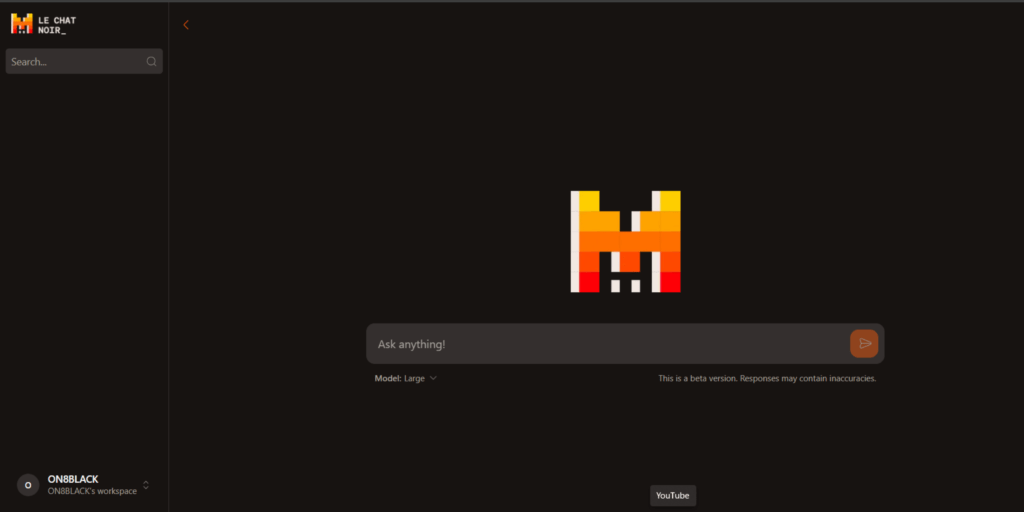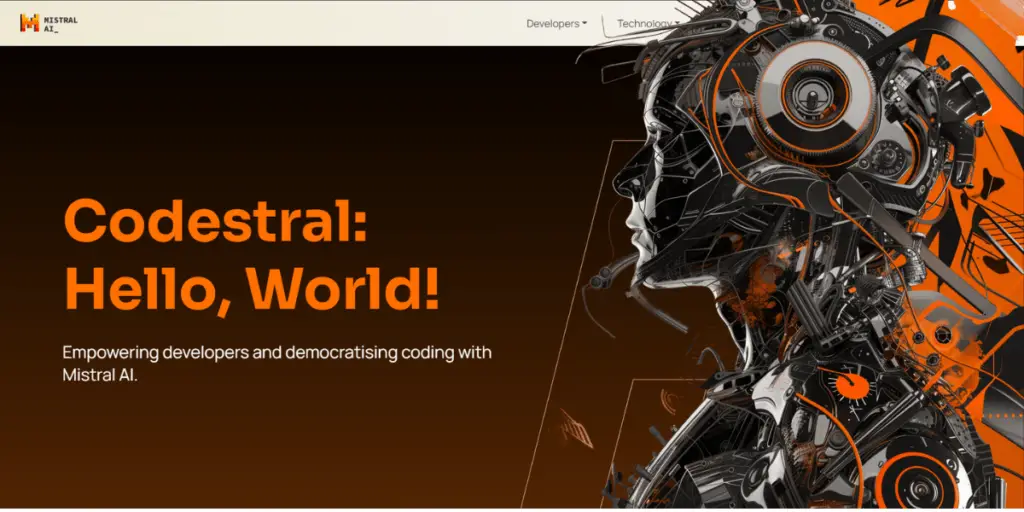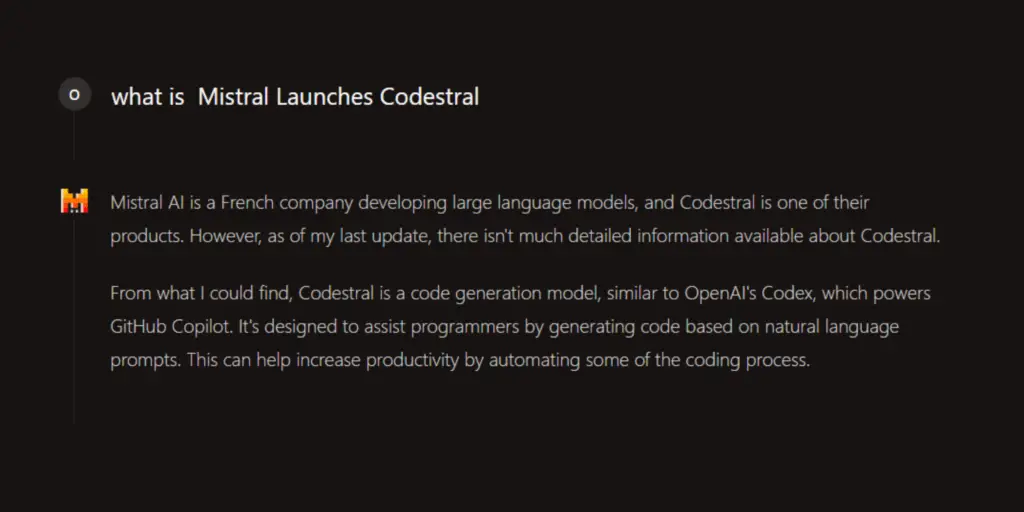Mistral, a French AI startup backed by Microsoft and recently valued at $6 billion, has made waves in the tech industry by launching its latest innovation, Codestral Generative AI.
This generative AI model, designed specifically for coding, aims to revolutionize how developers interact with and write code.
As part of Mistral’s ambitious roadmap, Codestral stands out for its sophisticated capabilities, offering developers a powerful tool to enhance their productivity and coding accuracy.
Codestral Generative AI
Codestral, Mistral’s generative AI model for coding, is designed to significantly enhance developers’ capabilities through its diverse and advanced features.
Codestral can complete coding functions, helping developers quickly finish code snippets. This feature supports faster development cycles and reduces the likelihood of syntax errors.
Using a fill-in-the-middle mechanism, Codestral can intelligently fill in missing parts of a codebase, making it easier for developers to work on large and complex projects.
Trained on a dataset encompassing over 80 programming languages, including Python, Java, C++, JavaScript, and Bash, Codestral is versatile and capable of supporting various development needs.
Codestral can generate coding tests, which helps ensure that the code works as intended and meets the required standards.
Developers can ask Codestral questions about the codebase in English, facilitating better understanding and quicker troubleshooting.

Codestral operates through a shared instruction and completion API endpoint, allowing seamless integration into existing development workflows and advanced AI applications.
Integrated into Mistral’s conversational AI platform, Le Chat, Codestral provides an intuitive and natural way for developers to interact with the model.
Codestral is also integrated into popular app frameworks and development environments such as LlamaIndex, LangChain, and Continue. Dev, and Tabnine, enhancing its accessibility and usability.
Technical Specifications
Codestral boasts an impressive 22 billion parameters, which define its proficiency in analyzing and generating code.
This large parameter count enables the model to understand and develop complex code snippets across various programming languages, including Python, Java, C++, JavaScript, and Bash.
The model’s extensive training in over 80 programming languages ensures its versatility and adaptability to different coding environments.
Codestral is integrated into Mistral’s conversational AI platform, Le Chat, providing a natural and intuitive interface for developers to interact with the model.
It supports a shared instruction and completion API endpoint, facilitating seamless integration into various development workflows.
Codestral is compatible with popular app frameworks and development environments such as LlamaIndex, Lang Chain, and Continue. Dev, and Tabnine, making it accessible to a broad audience of developers.
Despite its advanced capabilities, Codestral has commercial usage restrictions due to potential training on copyrighted content.
These restrictions prohibit using Codestral and its outputs for commercial activities, ensuring compliance with intellectual property laws while still offering powerful coding assistance for educational and non-commercial purposes.
Commercial Usage and Limitations
This limitation likely stems from the training data, possibly including copyrighted content, necessitating cautious usage to avoid legal issues related to intellectual property.
The restriction on commercial use means that while developers can leverage Codestral for personal projects, learning, and non-commercial applications, they cannot integrate its outputs into commercial products or services.

This measure ensures compliance with intellectual property laws. It protects the rights of content creators whose work may have contributed to the training data.
Despite these restrictions, Codestral remains a valuable educational and non-commercial development tool. It provides developers with powerful coding assistance, helping them learn and refine their skills without the legal complexities associated with commercial use.
AI Adoption in Development
The launch of Codestral by Mistral is set against the backdrop of an ongoing debate about the role of AI tools in the software development process.
AI-assisted coding tools like Codestral are increasingly integrated into development workflows, reflecting a broader trend toward adopting AI in various technical fields.
A Stack Overflow poll from June 2023 revealed that 44% of developers now use AI tools in their development processes, with an additional 26% planning to do so shortly.
This significant adoption rate underscores the perceived benefits of AI tools, such as increased productivity, reduced manual coding effort, and enhanced ability to handle repetitive tasks.
The integration of AI tools is subject to controversy. Critics point out that while AI can accelerate development, it can also lead to more erroneous code being pushed to codebases.
The automated nature of these tools may inadvertently introduce bugs and security vulnerabilities, which can be amplified in complex software projects.
Security researchers have raised concerns about the potential for AI-generated code to propagate existing issues or create new ones, emphasizing the need for thorough review and testing of AI-assisted outputs.
Despite these concerns, the trend toward AI adoption in development is gaining momentum.
Tools like Codestral offer significant advantages, particularly in educational and non-commercial contexts where the risks associated with erroneous code are less critical.
Market Expansion
Mistral is leveraging the launch of Codestral to bolster its market presence, particularly in the United States.
The company has recently appointed Marjorie Janiewicz, a former Foursquare CFO, as its first U.S. general manager, signaling a strategic move to tap into the lucrative American market.
This appointment aligns with Mistral’s broader goal of expanding its footprint and attracting a diverse clientele looking for alternatives to AI solutions offered by major tech giants like OpenAI and Google.
Mistral’s market strategy emphasizes its open-source approach, which contrasts with the closed systems of its competitors.
By openly sharing and allowing customization of its underlying code, Mistral positions itself as a more flexible and transparent option for businesses.
This approach is particularly appealing to companies prioritizing control over their AI tools and seeking to avoid significant tech providers’ proprietary constraints.

The startup also focuses on expanding its workforce to support its growth ambitions. With plans to hire more staff, Mistral aims to strengthen its operational capabilities and better serve its growing customer base.
This expansion is backed by interest from prominent investors, including DST, General Catalyst, and Lightspeed Venture Partners, who are considering significant investments in Mistral’s latest funding round.
The company’s valuation has tripled since December, reflecting strong investor confidence and market potential.
Future of Codestral
Mistral’s strategic focus on an open-source approach and customization options for its AI models positions it as a versatile alternative to established AI providers like OpenAI and Google.
This strategy will attract many businesses seeking more control and flexibility in their AI solutions. The startup’s valuation, which has tripled to $6 billion since December, indicates strong market confidence and sets the stage for further growth and innovation.
Codestral’s advanced capabilities and integration into various development environments demonstrate Mistral’s commitment to enhancing developer productivity and coding efficiency.
As more developers adopt AI tools like Codestral, the broader software development industry will likely see increased productivity and streamlined workflows. This could lead to faster project turnarounds and more innovative software solutions.
Despite the current commercial usage restrictions, Mistral’s emphasis on educational and non-commercial applications of Codestral ensures a broad user base that can benefit from its capabilities without legal concerns.
This approach fosters learning and skill development among developers. It builds a strong foundation for future commercial applications as the legal landscape around AI-generated content evolves.
Mistral’s ongoing expansion into the U.S. market, highlighted by the appointment of Marjorie Janiewicz as its U.S. general manager, signifies its ambition to become a global player in the AI industry.
By capitalizing on fresh demand and hiring additional staff, Mistral aims to solidify its presence and cater to the diverse needs of its growing clientele.
The company’s ability to attract significant investments from prominent backers like DST, General Catalyst, and Lightspeed Venture Partners underscores its potential for long-term success.


